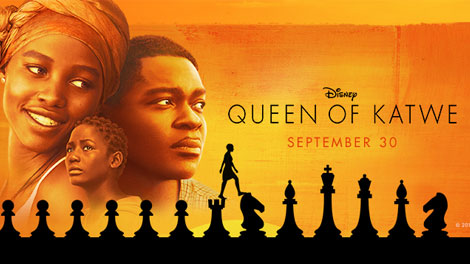Queen of Katwe: An Insight on Opportunity
October 23, 2016
Success is an equation. Every single moment of opportunity adds up to a final solution of greatness. Not everyone; however, gets those moments of opportunity. Some people live their entire lives without a single moment of such an opportunity. Even the most talented people will never be recognized, due to prisons of poverty, racism, sexism, and more. But when we give an opportunity to those who would otherwise never be able to rise to success, something truly special can occur.
Queen of Katwe, directed by Mira Nair and starring Madina Nalwanga, David Oyelowo, and Lupita Nyong’o, shares a story of one girl’s success stemming from small moments of unlikely opportunity. The film follows the true story of Phiona Mutesi (Nalwanga) living in the slum of Katwe in Kampala, Uganda. Phiona comes across a missionary program run by Robert Katende (Oyewolo) that teaches children to play chess. Phiona began to get involved in this lessons and soon developed into a chess prodigy. Through her preteen years, Phiona’s skills heightened and took on competitions throughout her province, her country, and even the world. With the juxtaposition of the comfortable life she found as a successful chess player contrasted to the tough life she experiences back home, she decides to use the skills she discovered within herself to get an education, buy a house for her mother (Nyong’o), and work to creating a better life for herself and her loved ones.
Queen of Katwe teaches important lessons to an audience of all ages. As students living in an affluent town, attending a great school, we take our privilege for granted very often. Senior Natalie Gebhardt says the film, “put [her] life into perspective a lot because [she] complains about school a lot when [she] should be grateful for [her] free education”. We forget that other people our age would love to be in our position, but cannot be.
We will never know the most intelligent or most talented person in our world, because they may be living in a marginalized positions in which they are never given the opportunity to present or develop our skills. But by improving the lives of others so they may have the opportunity to succeed, we allow them to achieve and change the world around them as well, creating a cycle of advancement. When someone invests in someone in need, a whole society can benefit.
I truly enjoyed the Queen of Katwe. I commend the directing choices of Nair. The film was shot almost entirely in Katwe itself, creating an accurate representation of Phiona’s environment. The choice of casting 15 year old Ugandan dancer as Nalwanga as Phiona was clearly a great one; Nalwanga flawlessly developed Phiona as a hardworking and charming hero. Even the stylistic choices were well made, with colorful, authentic costumes, contrasts of quiet, serene shots and engaging, energetic scenes, and overall beautiful cinematography. The film stands as a reminder for the importance of diversity in today’s cinema, and I hope it is a contender for this year’s awards season.


































